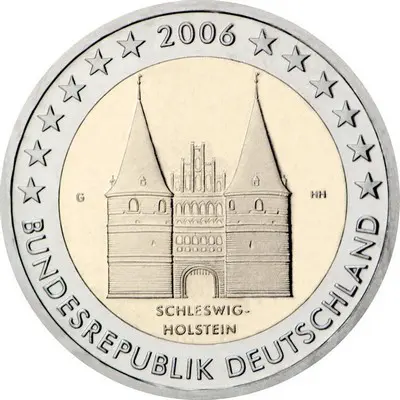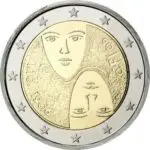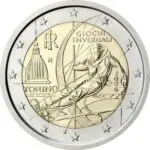
This post is also available in:
Français (French)
This coin is the first commemorative 2 euro coin issued by Germany.
It is also the first coin in a series of 16 coins on the German Lands.
Introduction
This 2 euro coin, issued by Germany in 2006, celebrates the state of Schleswig-Holstein. This program is part of a series dedicated to the different German Länder. It highlights the particularities and monuments of each region. The central theme of this piece is the Holstein Gate. This monument is an iconic symbol of the city of Lübeck, located in Schleswig-Holstein.
Coin description
The obverse of the coin features a detailed image of the Holstein Gate, or Holstentor in German. This Gothic building dates from the 15th century. Indeed, it is one of the best preserved medieval gates in Germany. Two imposing towers frame a central building decorated with windows. Additionally, the structure shows minute architectural details. This representation highlights the grandeur and symmetry of the structure.
At the top of the coin, the year of issue “2006” is engraved. It is centered above the Holstein Gate. Furthermore, around the perimeter of the room, we observe twelve stars. These stars symbolize the twelve stars of the flag of the European Union. Furthermore, at the bottom of the building, the inscription “SCHLESWIG-HOLSTEIN” is visible. It indicates the land represented. On each side of the building, the initials “G” on the left and “HH” on the right identify the Hamburg mint and the engraving workshop.
The bottom of the coin bears the inscription “BUNDESREPUBLIK DEUTSCHLAND”. It means “Federal Republic of Germany” in French. This mention recalls the origin and issuing authority of the piece. The careful details and harmonious proportions of the engraving illustrate the historical and cultural significance of the Holstein Gate.
Conclusion
In summary, this 2 euro coin from 2006 issued by Germany honors the state of Schleswig-Holstein. She does this through the representation of the Holstein Gate. This medieval structure, emblematic of Lübeck, testifies to the historical and architectural richness of the region. Therefore, the attention to detail on this piece highlights the importance of preserving and celebrating historical monuments. These shape the cultural identity of each German state.
| Country of Issue: | |
| Date of issue: | February 3, 2006 |
| Total mintage: | 30.000.000 on 5 mints (A, D, F, G, J) |
| Mint A: | 6.000.000 |
| – BE: | 130.150 |
| – BU: | 150.000 |
| – UNC: | 5.719.850 |
| Mint D: | 6.300.000 |
| – BE: | 130.120 |
| – BU: | 150.000 |
| – UNC: | 6.019.880 |
| Mint F: | 7.260.000 |
| – BE: | 130.120 |
| – BU: | 150.000 |
| – UNC: | 6.979.880 |
| Mint G: | 4.260.000 |
| – BE: | 130.120 |
| – BU: | 150.000 |
| – UNC: | 3.979.880 |
| Mint J: | 6.300.000 |
| – BE: | 130.120 |
| – BU: | 150.000 |
| – UNC: | 6.019.880 |
| Engraver: | Heinz Hoyer |
| The edge: | |
| Rarity: | |
| Official Journal: | C2006/033/04 |
| My collection: | [cbxwpbookmarkbtn] |
Do you want to know the technical specifications of this coin? Feel free to visit the page dedicated to the specifications of a 2-euro coin.



Leave a Reply